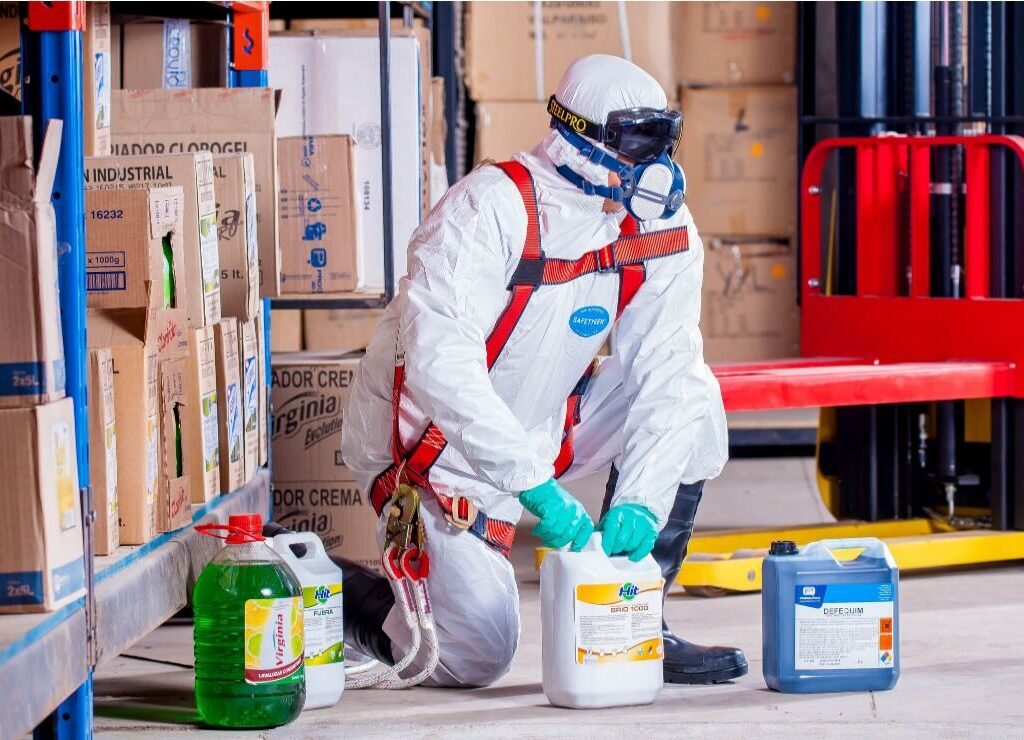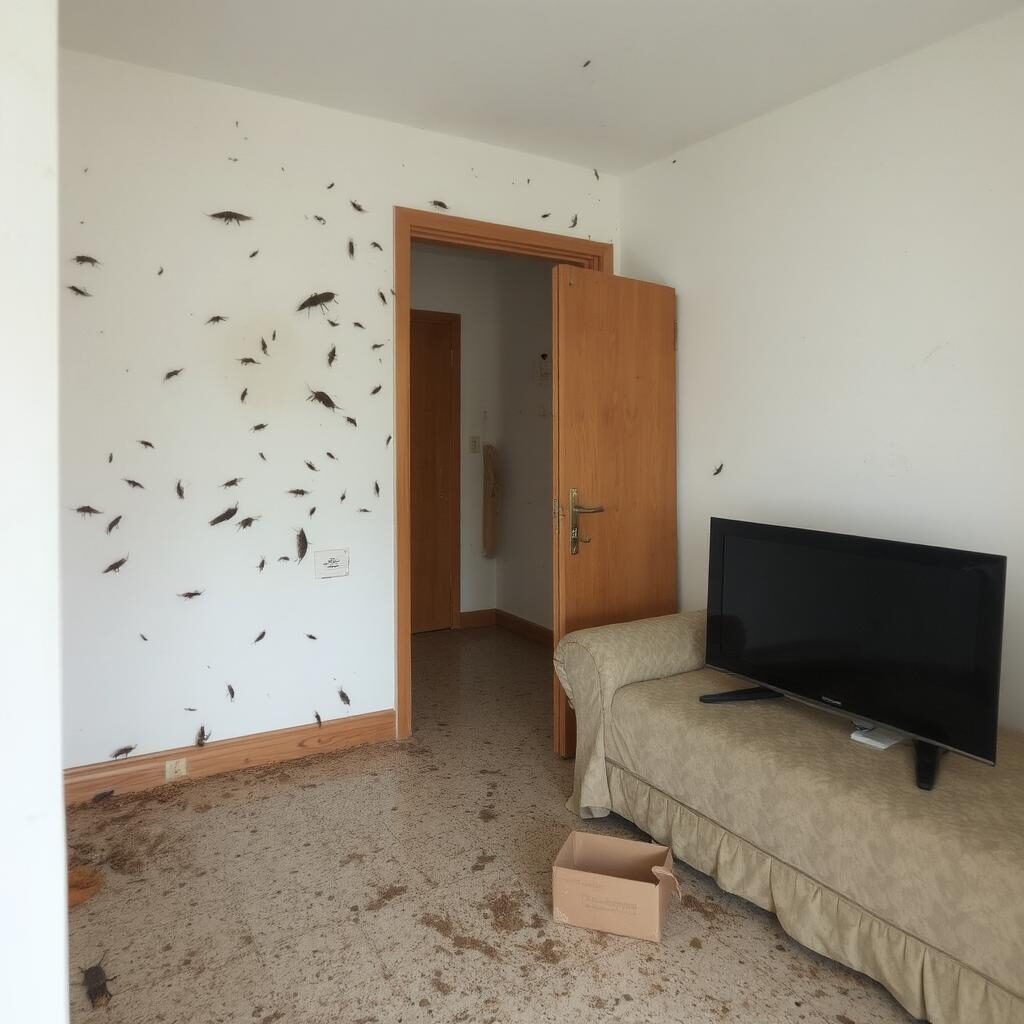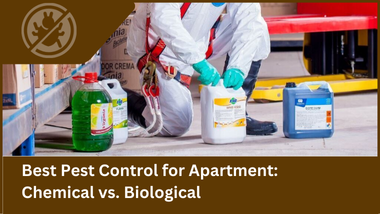With 82% of renters reporting some form of pest problem each year, a crucial question arises: when it comes to choosing the best pest control for apartments, should you opt for fast-acting chemicals or more eco-friendly biological methods
This question becomes more prominent when you come home after a long day, only to find ants marching across your kitchen counter or hear the unsettling sound of a mouse scurrying in the walls. Do you go for the aggressive chemical route or the eco-friendly path?
This post will guide you through both options to help you make an informed decision on the best pest control for apartment living. Let get started!
What is Chemical Pest Control?

Chemical pest control is often considered the go-to solution for those seeking the best pest control for apartment situations. This method relies on synthetic pesticides to combat pests, disrupting their physiological processes for rapid results.
These treatments are designed to eliminate pests quickly and can cover a broad range of unwanted visitors, making them a popular choice among apartment residents.
However, while they can provide immediate relief, chemical pest control carries inherent risks. Knowing the advantages and disadvantages is vital in making a decision between chemical and biological pest control, particularly regarding the use of bait versus insecticides.
Advantages of Chemical Pest Control
- Fast Action: One of the most appealing aspects of chemical pest control is its ability to deliver rapid results. Whether dealing with rodents or insects, chemical treatments like insecticides can provide immediate relief, allowing you to regain your peace of mind quickly.
- Versatile Pest Coverage: Chemical methods can tackle a wide variety of pests, from common nuisances like cockroaches and bedbugs to more stubborn invaders such as ants and termites. This broad-spectrum effectiveness allows you to address multiple pest problems with a single approach.
- Extended Protection: Many chemical treatments offer prolonged protection, keeping your apartment pest-free for weeks or even months. This durability means fewer applications are needed over time, reducing the hassle of constant pest management.
Disadvantages of Chemical Pest Control
- Health Risks: Exposure to chemical pesticides can pose serious dangers, especially for vulnerable populations such as children, pets, and individuals with allergies or respiratory issues. Even minimal contact with these substances can lead to health complications.
- Environmental Concerns: Chemical runoff can seep into the soil and waterways surrounding your apartment building, leading to contamination that adversely impacts local ecosystems. This pollution can harm beneficial insects, aquatic life, and even plants.
- Potential Resistance: Continuous use of the same chemical treatments can lead to certain pests developing immunity, resulting in decreased effectiveness over time. This cycle can increase costs and health risks.
While chemical pest control may provide fast results, it’s essential to weigh these benefits against the potential long-term drawbacks before deciding on the best pest control for your apartment. For those who prioritize sustainability and environmental well-being, biological pest control offers a compelling alternative.
What is Biological Pest Control?

In the quest for sustainable and eco-friendly pest management, biological pest control emerges as a compelling alternative. This approach uses the power of nature’s own agents, natural predators, parasites, and pathogens—to manage pest populations without relying on synthetic chemicals.
For many apartment dwellers, this could be the best pest control for apartment living, especially for tenants concerned about health and environmental impacts.
Advantages of Biological Pest Control
- Eco-Friendly: Biological pest control methods rely on natural processes to manage pest populations, leaving no harmful residues that contaminate soil and water. By promoting biodiversity, these methods actively support a healthier ecosystem.
- Health Safety: Biological methods are generally much safer for tenants, especially families with children and pets. Since they use natural agents rather than synthetic chemicals, there’s a lower likelihood of exposure to toxic substances.
- Sustainability: Biological pest control promotes sustainability by establishing a natural balance within the ecosystem. Once implemented successfully, there is often less need for repeated applications of chemical insecticides, contributing to a more stable environment.
Disadvantages of Biological Pest Control
- Slower Results: One of the primary drawbacks is that biological pest control often takes longer to show significant results compared to chemical solutions. This slower action can be particularly challenging in severe infestations where immediate relief is necessary.
- Target Specificity: Many biological agents are designed to target specific pests, which can restrict their overall effectiveness against broader infestations. Homeowners may need to combine biological controls with other methods for comprehensive pest management.
- Time for Establishment: Biological methods often require time for natural predators to establish themselves before they can effectively reduce pest populations. This establishment period can prolong pest issues and lead to dissatisfaction with results.
Safety Considerations: Choosing the Best Pest Control for Your Apartment
Safety is paramount when choosing a pest control method, especially in shared living environments like apartment buildings. Understanding the potential risks and benefits of both chemical and biological approaches is crucial in selecting the best pest control for your apartment.
Chemical Pest Control Safety:
- Environmental Impact: Chemical pesticides can contaminate soil and water, leading to long-term ecological damage.
- Non-Target Effects: These chemicals can unintentionally harm beneficial organisms, disrupting the natural balance of ecosystems.
- Health Risks: Prolonged exposure or improper handling of pesticides can pose significant health risks to humans and pets.
Biological Pest Control Safety:
- Eco-Friendly: Biological agents leave no toxic residues, reducing harm to non-target species.
- Targeted Approach: These methods focus on specific pest species, minimizing collateral damage to beneficial organisms.
- Reduced Health Risks: Biological control agents are generally safer for human health, making them a preferred choice for many households.
Making the Right Choice: Your Guide to the Best Pest Control for Apartments

Here are key considerations to guide your choice of in choosing the best pest control for apartments:
- Identify the Pest: Accurately identify the specific pest and assess the severity of the infestation.
- Evaluate Environmental Priorities: Consider the ecological footprint of your pest control choice. Chemical pesticides often have a larger impact compared to biological alternatives.
- Assess Economic Factors: Weigh the costs of materials and labor, factoring in any long-term expenses associated with ongoing pest management.
- Consider Health Risks: Don’t overlook the potential health risks posed by chemical pesticides, especially for residents in close quarters.
- Adopt Integrated Pest Management (IPM): Combining multiple strategies can reduce reliance on chemical pesticides and promote long-term sustainability.
Consulting with pest control professionals can also provide valuable insights into the latest developments in pest management and assist you in finding the best pest control for apartment living.
Conclusion
Effective pest control starts with informed decision-making. By properly identifying pests, assessing the severity of the infestation, and considering environmental and health factors, you can confidently choose the best pest control for apartments you can be comfortable with.
Embracing integrated pest management (IPM) and seeking expert guidance will further ensure a sustainable, successful approach that protects both your home and the environment.
Ready to take action and prevent pest issues in your apartment? Book now to schedule your apartment pest control service and keep your home pest-free and safe!
